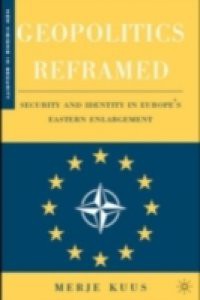Security and identity are the rhetorical pillars of European Union and NATO enlargement. Across Europe, that enlargement - not as a one-time event but as an ongoing process - is proclaimed to stabilize East-Central Europe and to create a Europe that is finally "whole and free". Europe's eastern enlargement is a profoundly geographic and geopolitical project, as it is based on territorial conceptions about the essence of places, the borders of cultures, and the locations of threat. It inextricably ties European security to the unresolved questions about the borders of Europe and Europeanness. Geopolitics Reframed asks how the bundling up of geopolitics and culture works, how it affects political debate, and how it is transformed in the course of Europe's eastern enlargement. The book provides the first in-depth analysis of security discourses in the states that acceded into the EU or NATO, or both, in 2004. Tracing the reframing of security and geopolitics from a military to a more diffuse cultural issue, Geopolitics Reframed illuminates the link between security rhetoric and identity politics. For scholars an practitioners of political geography, international relations, and contemporary Europe, it offers a fresh, subtle, and timely analysis of some of the key categories of political debate in today's Europe.

